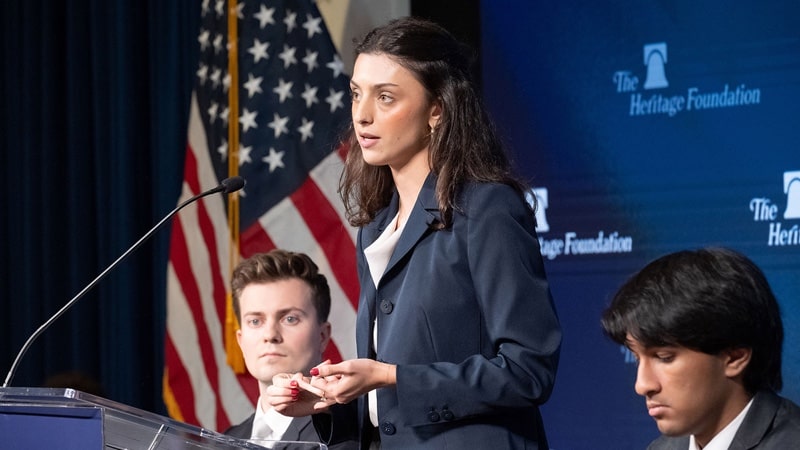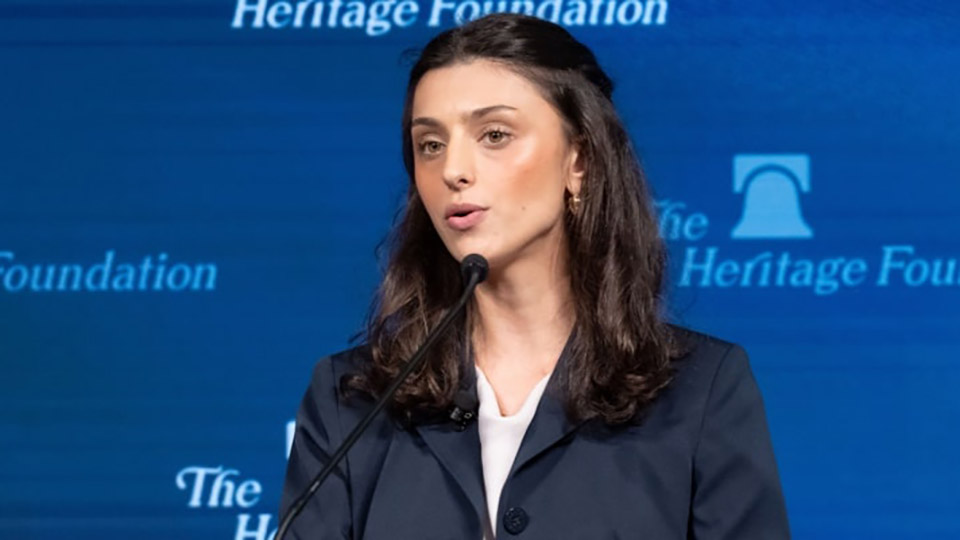Liana Gordan [PHIL 2025] is on a roll. Besides her studies at Tyndale University, over the past year she has had articles published in The Conservateur and an op-ed piece in the National Post (“It’s only common sense for Conservatives to defend the unborn”); she spoke at a Candlelight Vigil for Life; and so far this year she has attended a week-long trip to the United Nation's Annual Commission on the Status of Women, took part in the Witherspoon Institute’s summer program on Natural Law and Public Affairs, and accepted an internship position with the DeVos Center for Life, Religion, and Family at The Heritage Foundation this summer.
But before she begins her final year of undergraduate studies, she agreed to an interview with TU’s Marketing & Communications Department.
"Throughout my time at Tyndale, I have formed stellar relationships with students and staff. I have been mentored by spiritual and intellectual leaders. My reason has been nurtured; my skills have been refined and challenged."
Q. In a 2021 Bustle article, “The Rise of Christian TikTok,” its opening line is, “Liana Gordan says God used TikTok to save her.” Can you elaborate on that?
In 2020, I experienced the societal shut-down that accompanied COVID-19 the way most other teenagers did: living vicariously through my phone. As such, I spent much time on social media, including video platforms like TikTok.
At that time, I was engaged in producing content on social media that was vaguely “conservative,” but I soon became aware of how perilous and damning conservativism is without Christ.
I would often posit the existence of God to motivate my commitment to general conservative principles, such as respect for the dignity and intrinsic worth of human life. But I was not a Christian.
I began to feel convicted about things I had never paid notice to before. Suddenly my entire life—and the internal world of my thoughts and desires—were placed under the burning scrutiny of God’s holiness. I had no idea where these convictions were coming from.
Then I began to encounter videos of Christians on my phone, videos that exhorted me to read and obey the scriptures. God called me, and I responded. I began to read the Bible as an honest effort to understand Christianity. I began in the Gospel of John and was convinced after I had encountered Christ through his word that I was in desperate trouble: I needed a Saviour.
Social media was an avenue that God used to bring me to his Son, primarily through the convicting words I heard—albeit through a screen—that seems to be our generation’s equivalent of “street-preaching” (standing on a digital corner of the online streets to proclaim the good news of the Gospel).
"The Tyndale Philosophy program has equipped me to engage with the most pressing problems within philosophy and culture in a way that is charitable and reasonable."
Q. Was this around the time that you sought out Tyndale University to study philosophy? What was it about Tyndale that caught your imagination and has held it for three years?
When I became a Christian, I became convinced I needed to pursue Christian education. Having spent my adolescence in public school, I was made aware of the loss of never having received a Christ-centred education. I had fallen in love with philosophy in school and felt it was a prudent choice of study if I wanted to continue to law school after undergrad.
I began to research, and that’s when I found Tyndale. Specifically, I came across the Philosophy department’s social media page. I discovered that many Tyndale philosophy grads had pursued careers in law and philosophy after graduation. It was wonderful to know there was an academic institution promoting sound philosophical reflection in Canada, and in Toronto more specifically. I knew then that I should apply.
Throughout my time at Tyndale, I have formed stellar relationships with students and staff. I have been mentored by spiritual and intellectual leaders. My reason has been nurtured; my skills have been refined and challenged. Difficult course readings and cogent, accessible lecturing have advanced my understanding of philosophy as a Christian, and equipped me with the ability to critically engage with the most pertinent questions and problems facing Christians today.

Q. Why philosophy? What are the philosophical questions today that you think are most important to address, and how has Tyndale’s BA program prepared you to answer these questions through a Christian lens?
People had many questions for me when I became a Christian. I encountered people online who smeared Christianity as an anti-intellectual and bigoted religion. People in my personal life seemed to buy into the same narrative.
As I looked around the world through my newfound Christian identity, I struggled against the stereotypes about Christians that pervaded the culture. That also played a large part in my desire to pursue a Christian education that would equip me to engage with the world in a way that is winsome and biblical.
The Tyndale Philosophy program has equipped me to engage with the most pressing problems within philosophy and culture in a way that is charitable and reasonable.
In our philosophy classes, we do not shy away from difficult and hard-to-answer questions. We run to them, consistently seeking out the most challenging arguments and problems facing the Christian worldview. We critically analyze and engage with the position of alternative philosophies—from naturalism to Spinozian pantheism.
Ultimately, the philosophy program has equipped me by positioning my worldview on the solid and unfailing ground of Christ, the solid rock on which I stand.
"I think Christians should be emboldened by their faith in the Saviour Jesus; it should invigorate us to engage with the world, not shrink back in terror into our personal spheres."
Q. In the Bustle article you say, “I want to be a spokesperson for Christianity for my generation because Christianity has something to say about the world today.” What exactly do you think Christianity has to say?
One of the first things that we learn about the world is that something is seriously wrong with it. In encountering the world, we also confront the profound personal reality of our own sin. I believe this intuition is essential to our understanding of the world—and every ideology or philosophy attempts to account for it in one way or another.
It seems that the most fashionable ideologies of the day assume the existence of evil. Many of them, as a response, propose varying solutions. The Marxist maintains that a classless society and eradication of all exploitation, oppression, and, ultimately, profit, is the ideal solution; the neo-liberal might maintain that seeking social justice and equity is the right response. By contrast, Christianity is the only worldview that can provide a satisfying response to the problem of sin in pointing us to a perfect Saviour.
In saying that Christianity has something to say about the world today, I also mean to address the seemingly prevalent belief that Christianity posits “antiquated” ideas about human nature, the physical world and morality. Often, Christians are portrayed as uneducated bigots. Society, it is said, has simply outgrown this way of seeing the world.
I think Christians should be emboldened by their faith in the Saviour Jesus; it should invigorate us to engage with the world, not shrink back in terror into our personal spheres. Christians should reject the fatal distinction between fact and value drawn by many post-Enlightenment philosophers who desired to relegate religion—and questions of right and wrong—down to a “personal” matter of “opinion” or “taste.”
The Bible won’t have that. On the contrary, we are exhorted to be ready to give a defence to everyone who asks for the hope we have in us (I Peter 3:15). Christianity has something to say about the world today because Christ is Lord over all the earth, presently. It is a reality that awaits being fully revealed, but a reality, nonetheless.
"My achievements in and outside of school have been massively influenced by the relationships I have forged at Tyndale, the intellectual formation the courses inspire and the spiritual counsel I have received from friends and faculty."
Q. To use a current term, do you see yourself as an “influencer”?
I see myself as an influencer insofar as I am aware that my conduct and speech “influence” the people around me. By that very standard, everyone, in some way or another, is a sort of “influencer.” We are called into the world to be salt and light, not atomistic individuals motivated primarily by our desire to maximize our own happiness or exert our autonomy.
I try my best to inspire this same disposition in all of my peers at school. My achievements in and outside of school have been massively influenced by the relationships I have forged at Tyndale, the intellectual formation the courses inspire and the spiritual counsel I have received from friends and faculty. I believe I do my part to inspire intellectual curiosity and charitable dialogue within Tyndale’s walls, and my peers have reciprocated in that endeavour.
Q. When do you graduate, and what are your future plans, both in the short and long terms?
Lord willing, I am set to graduate by May 2025. I am currently considering applying to law schools in November, where I hope to study constitutional law. Most importantly, I plan on getting married in May 2025.
I do not yet know exactly where the Lord is calling me for my career. I am okay with that. As a Christian, however, I know that I must not give into the temptation to measure the success of my life and career by the maximization of my personal interest and status.
Contrary to what the philosophers of today may indicate, man is not the measure of all things. My summum bonum (highest good) is not pursuing as many pleasurable experiences as I can, or avoiding as much pain as possible.
It is advancing and participating in the kingdom of God. Orienting my career around this high and most fulfilling calling is a gift—indeed, a gift of grace.
